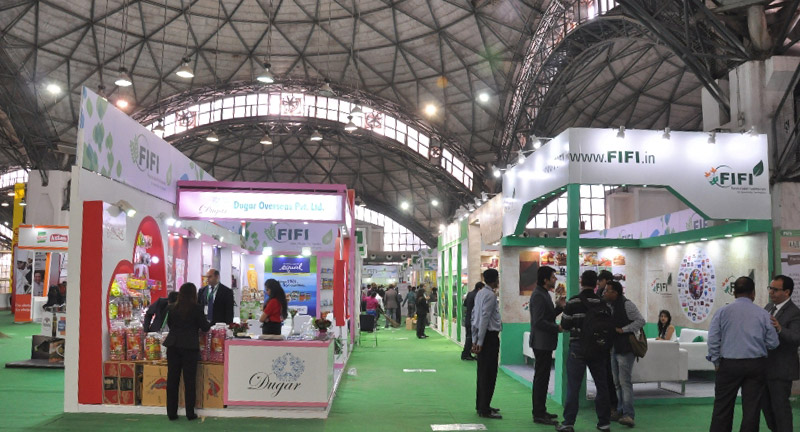[mc4wp_form id=”2320″]
Amit Lohani, Founder & Director, FIFI: F&B stakeholders are keen to get back to normal routine
Amit Lohani, Founder & Director, FIFI: F&B stakeholders are keen to get back to normal routine

Forum of Indian Food Importers (FIFI), a non-government and a not-for-profit entity, works primarily to enhance the F&B business in India via its innumerable outreach endeavours. In an exclusive interview, Amit Lohani, Founder & Director, FIFI talks to Sanjiv for WOH News about critical measures that the forum is taking to support Government of India’s programmes as well as align food importers to find their feet here. He also highlights that riding on vaccine-based confidence, stakeholders are keen to get back to the normal routine of meeting associates in person
What FIFI is currently deliberating upon? What is the present count of members and where do you expect FIFI membership growing to by the year-end?
FIFI stands for providing comprehensive knowledge on Indian food & beverage market, food safety regulations, legal metrology requirements, assistance with labelling requirement basis the Indian regulations, backward integration, cold chain logistics, business enhancements, market exploration, organised retail studies, and online retail evaluations. Thus, FIFI members are dedicatedly working to support several of government’s programmes like Eat Right India, Make in India, Skill Development and Drink Responsible, and also support social causes like the upliftment of women entrepreneurs, research & development, and encouraging food processing facilities to be conceptualised in country.
FIFI is an association representing over 5,000 members and other stakeholders with over 1,600 brands; apart from Indian business houses, our member base comprises over 74 countries, which includes businesses operating in Indian market or commerce. FIFI does not function with an objective to reach a target number; however, we do believe in organic growth, attributed to working with like-minded businesses and stakeholders committed to the India F&B story.
Which events of FIFI are lined up that food importers should participate to gain knowledge about the new developments in the sector?
After three worst quarters, the sectorial economy is recovering from the pandemic-driven recession as well as a contraction in absolute terms. Furthermore, driven by vaccination-based confidence, stakeholders are keen to get back to the normal routine of meeting associates and personal interactions. With this we, as FIFI, are working with the Government of India and supporting them as co-associate in creating the international pavilion at AAHAR trade show in April of 2021. Apart from that majority of interactions have been virtual and we sense that more hybrid events will evolve. Inability to taste, touch and feel the samples is a big challenge topped with missing social interaction; nevertheless, the sense of uncertainty will take some time to wither off.
As an interim measure, the trade has not stopped and FIFI on a routine basis is getting interest from international companies via their respective government or chamber or representative, which is shared with our robust member base.
Which category of products do you perceive will propel the market conditions of importing agencies, and the reason for your assessment?
The thing which remained constant since the pandemic struck the world is the need of a healthy immune system. This in turn is attributed to a balanced diet, physical activeness, stress management and enough sleep. Nonetheless, the initial phase of national lockdown led to staying at home all day, translating into easy access to food in the kitchen, a greater temptation to snack and lack of structured meal time.
Emotional eating from boredom or anxiety led to consumption of extra calories and that has been pretty evident from the sales patterns indicating high purchase of snacks, convenience, and packaged food items. Eventually consumers seem to have taken a pause and new emerging trends are showcasing inclinations towards health, vide amalgamation of immunity-enhancing, protein-rich, natural, and a free range of products.
Constant reminders from the Food Safety and Standards Authority of India (FSSAI) and international bodies like World Health Organisation (WHO) have also contributed to this decision making, highlighting the importance of good nutrition. Interestingly, the allied sector like fitness apps, too, are seeing a surge in their market penetration indicating that consumers have learned to evolve with this new dynamics and that optimal health is of prime importance.
You have recently talked about a few government norms creating an ambiguous trade environment. Is it really impeding the growth of food importers?
We understand the concept of vertical and horizontal components of multi-level governance and its importance in a democracy like India. However, our debate remains around the fundamental problem of added bureaucratic burden and the ambiguity it creates in the trade. Empirical examples like lack of clarity relating to imports of organic food products, suggested requirement of physical audits of international F&B manufacturing facilities; the condition of Certificate of Analysis or prerequisite to provide a non-GM certificate have furthered the ambiguous trade environment. Although a majority of food imports into India are mainly used as intermediates in facilitating the production of food and beverages, the sector remains superlatively regulated.
It must be noted that a number of stakeholders who are focused on exports from India are fearful of retaliation from other countries. In the current era of globalisation, India cannot be seen as abandoning the doctrine of mutual trade relationships and econometric assessments to showcase that the principal impediment to market access to India remains high on Basic Custom Duty (BCD) of food and beverages.
A country, which on one hand invites investors, is also taking restrictive measures on the other hand – which is not a very positive reflection. We as a nation need to consider AatmaNirbhar Bharat Abhiyan as more holistic and inclusive.
In this scenario, what would be the immediate challenges you foresee for food importing companies (from HoReCa perspective and end-consumers) that could be turned into positive propositions with smart thinking?
The contact anxiety has never been this massive and HoReCa industry has seen the maximum bearing of the same. Stakeholders from allied sector like alcoholic and non-alcoholic beverages, cheese, poultry, meat, fish, ingredients, fresh category, and several others have seen an unprecedented impact and had to function in a way never seen before.  Today the businesses are following more stringent sanitary and hygiene measures and are going extra miles to have more control over the trade environment. Covid-19 has reinforced that realities are resulting into new propositions where market trends like limited social outings with a willingness to order are becoming the driving forces. The changing trends include cloud kitchens mushrooming in every nook and corner, online e-commerce platforms offering socially distant delivery mechanism, and availability of food free from pesticides, gluten, sugar, meat, soy, lactose, etc. In addition, technology is emerging as a mainstream enabler and resulting in massive investments in tech infra.
Today the businesses are following more stringent sanitary and hygiene measures and are going extra miles to have more control over the trade environment. Covid-19 has reinforced that realities are resulting into new propositions where market trends like limited social outings with a willingness to order are becoming the driving forces. The changing trends include cloud kitchens mushrooming in every nook and corner, online e-commerce platforms offering socially distant delivery mechanism, and availability of food free from pesticides, gluten, sugar, meat, soy, lactose, etc. In addition, technology is emerging as a mainstream enabler and resulting in massive investments in tech infra.
What are the unique strategies that need to be adopted for companies looking at penetrating new markets?
There is no defined success mantra for the Indian market – nevertheless, it is necessary for international players to understand that their target audience is more evolved and informed. Increased international travel, opening of global cuisine restaurants, internet access, and entree to universal food channels are some of the factors contributing to this progressive dynamics.
Also, the Indian consumer is seeking food safety, quality and brand names. The countries and companies that remained committed, opted for long-term relationship and topped it with perseverance have seen better growth trajectory here.
Additionally, global companies need to be mindful of the fact that India is an intriguing yet overwhelming place, which is known for its ancient charm, age-old rituals, dynamic IT population, and melting pot of numerous cuisines. It is advisable to absorb the changing trends and grow with the flow.

Leave a Reply
You must be logged in to post a comment.
